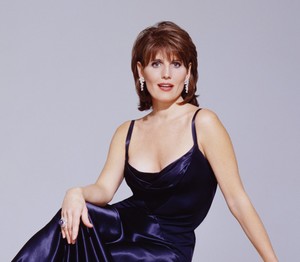|
HOME |
MY COLLECTION |
LINKS |
PHOTOS |
ONE LINERS |
FOR SALE |
LUCIE |
LUCY STUFF |
GUESTBOOK
|
CONTACT ME
|
|



|
Lucie Arnaz evokes dad Desi Arnaz in new 'Latin Roots' CD
April 1, 2010 Manhattan Local Music Examiner Jim Bessman  Lucie Arnaz's new album Latin Roots puts the spotlight on the comparatively underappreciated paternal half of her legendary parents, I Love Lucy TV co-stars Lucille Ball and Desi Arnaz.
Lucie Arnaz's new album Latin Roots puts the spotlight on the comparatively underappreciated paternal half of her legendary parents, I Love Lucy TV co-stars Lucille Ball and Desi Arnaz.
The 14 tracks on the disc are either directly taken from her father's music (Desi Arnaz's signature song "Babalu" is included, of course) or inspired by him--like Lucie's cover of "Blame It On The Bossa Nova." "Cynthia Weil and Barry Mann wrote a brand new last verse for me," says Lucie, referring to the newly enshrined Rock and Roll Hall of Fame songwriting team who co-wrote Eydie Gorme's 1963 hit. She also covered Shelley Fabares' 1962 hit "Johnny Angel," giving it what she calls an "Astrud Gilberto-like Latin-based rhythm." "I wanted a handful of my father's original songs that I loved, mixed with other material that would still pay homage," says Lucie, whose last album Just In Time came out in 1993. "I don't know why I didn't just go back into the studio, except that life took over," she continues. "I was in too many venues: a Broadway show--or a musical in London or touring nationally, taking the kids to school, ETE [the Education Through Entertainment multimedia company she formed with her fellow Broadway star husband Laurence Luckinbill]. I got distracted and the next thing I knew 10 years went by--though I was still doing concerts all the time, and Ron [her producer/arranger Ron Abel] and I were accumulating great arrangements." After Desi Arnaz died in 1986, Lucie took a year off to clean up his affairs. "I found some marvelous things, including cassettes of dozens of his performances and recordings," she recalls. "Even though I'd done Broadway and films and TV, I suddenly wanted to be that guy singing that music and with a band like that! Latin music is where my blood boils--with my appreciation for my father's music and style and showmanship. What he could do on stage really was terrific--so classy and fun. He always had a twinkle in his eye and could be sexy and nonthreatening at the same time!" Lucie performed a 90-minute Irving Berlin tribute program in Italy in 1988--which was then booked in the U.S. casino circuit for a year--and has been doing a nightclub act in various forms ever since. Her Babalu: The American Songbook Goes Latin--Featuring the Music of the Desi Arnaz Orchestra presentation last year at the 92nd Street Y last year helped engender Latin Roots. "My father was the Latin rhythm guy of the family--and the roots of why I do music," she says. "The album is specifically the roots of why I have a club act." Lead track "You And The Night And The Music" does in fact come from Lucie's nightclub set--though Abel gives it a Latin swing arrangement here. "I'll See You In C-U-B-A" was an Irving Berlin favorite of Desi's and included in Lucie's Berlin tribute. She recalls her father singing "Rumba Matumba" when she was a child, and also includes "El Cumbanchero"--"his staple next to 'Babalu'"--which she uses to close her shows. She co-wrote the lyrics to "The Music In Your Heart," which features her guitarist son Joe Luckinbill's music. On another personal note, Lucie also sings "I Love You," which Desi wrote for her stepmother (and best friend growing up), and Dan Fogelberg's "Leader Of The Band," which she performs in her shows as "my way of thanking my father." Lucie did an in-store signing/performance at J&R Music World last week and will perform Saturday at Queen's Theater in the Park. She has another New York in-store slated May 19 at the Lincoln Center Barnes and Noble. Also in May,after a pair of late April Broadway theater readings, she'll return to the lecture circuit. "I fell into speaking about balancing all this stuff I wanted to do with my life and successfully raise kids and have a family," she says of her "Surviving Success" speeches. "It's about stuff I went through when I was younger--what I learned the hard way!" Then from June through August she'll search for a New York venue to reprise Babalu. "We'll probably record it, since that's all of Dad's music," she says. "He had such a way of introducing the Latin beat to the American public in a way that was palatable and easy, and made the music adorable. And when he got on I Love Lucy, you didn't have to go to a nightclub to see him because all America saw him on TV. So he paved the way for the huge Latin music explosion we're seeing now." |
|
|